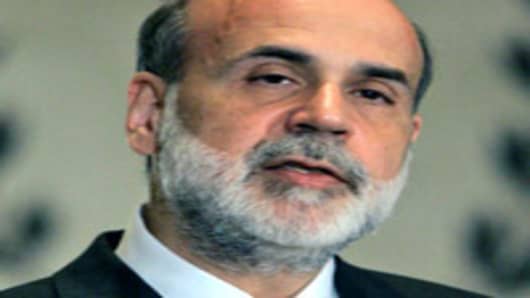Federal Reserve Chairman Ben Bernanke Monday sounded a warning over soaring energy costs and said the central bank would "strongly resist" any tendency for an inflationary psychology to take hold.
He said that despite data last week showing the unemployment rate jumped to 5.5 percent in May, the U.S. economy may have skirted a major decline.
Bernanke's remarks suggest inflation is occupying a more prominent spot on the Fed's radar screen after an intense focus on problems in financial markets.
"The latest round of increases in energy prices has added to the upside risks to inflation and inflation expectations," Bernanke said in remarks prepared for delivery to a conference organized by the Boston Federal Reserve in Chatham, Mass.
"The Federal Open Market Committee will strongly resist an erosion of longer-term inflation expectations, as an unanchoring of those expectations would be destabilizing for growth as well as for inflation," Bernanke said.
A text of his remarks was made available in Washington.
He also said that "although activity during the current quarter is likely to be weak, the risk that the economy has entered a substantial downturn appears to have diminished over the past month or so." The speech also pointed to rising nervousness at the Fed over recent surges in oil prices, which pushed U.S. gasoline prices to a record high of $4.04 a gallon last week.
Crude oil reached a record over $139 a barrel last week.
U.S. inflation rose 3.2 percent in the 12 months to April, and by 2.1 percent over the same period when volatile food and energy costs were excluded, according to the Fed's preferred inflation report, the government's personal income data.
The Federal Open Market Committee, the Fed's interest-rate setting committee, meets June 24-25. Financial markets largely expect the Fed will not begin to raise interest rates until its October meeting.
Bernanke said inflation remains high, reflecting commodities price rises. At the same time, he said, higher raw materials costs have yet to translate to higher costs for products or the need to raise worker pay in response.
But the Fed chairman cautioned there is no guarantee this will remain the case. "Future developments in this regard will bear close watching," he said.
Bernanke sounded a softer tone on worries about weak growth, saying that recent data had "only modestly" affected the Fed's view that the economy will regain strength later this year after a weak start.
U.S. gross domestic product expanded at a weak 0.9 percent annual rate in the first three months of the year, after a sluggish 0.6 percent annual rate in the final quarter of last year, the effects of the bursting of the U.S. housing bubble and a credit crunch triggered by a spike in mortgage delinquencies.
The economy still faces difficulties from the housing downturn and escalating energy costs, Bernanke said.
"The ongoing contraction in the housing market and continuing increases in energy prices suggest that growth risks remain to the downside," he said.
At the same time, the Fed's rate cuts, which have taken benchmark borrowing costs down to 2 percent from 5.25 percent in September, government rebate checks sent to taxpayers, and signs of healing in battered financial markets provide "some offset" to headwinds still facing the economy, the Fed chairman said.
The central bank also plans to continue measures aimed at helping financial markets recover.
"We have taken a number of actions to promote financial stability and remain strongly committed to that objective," he said.


